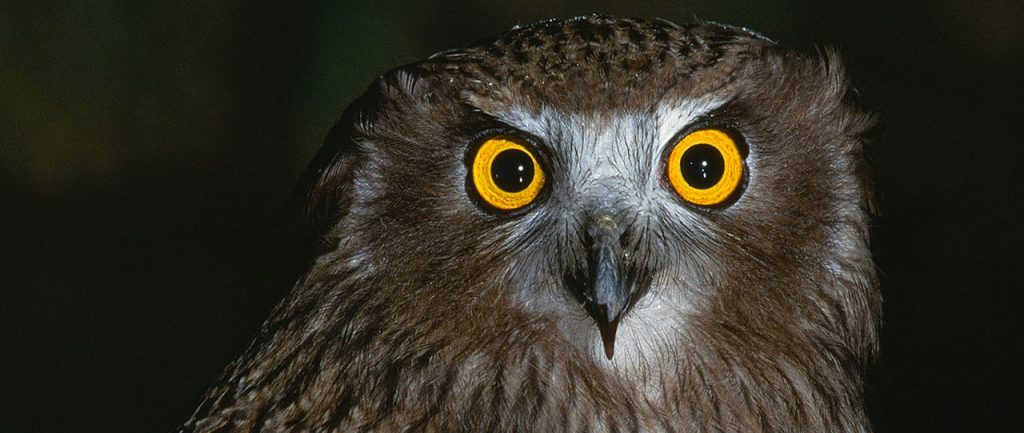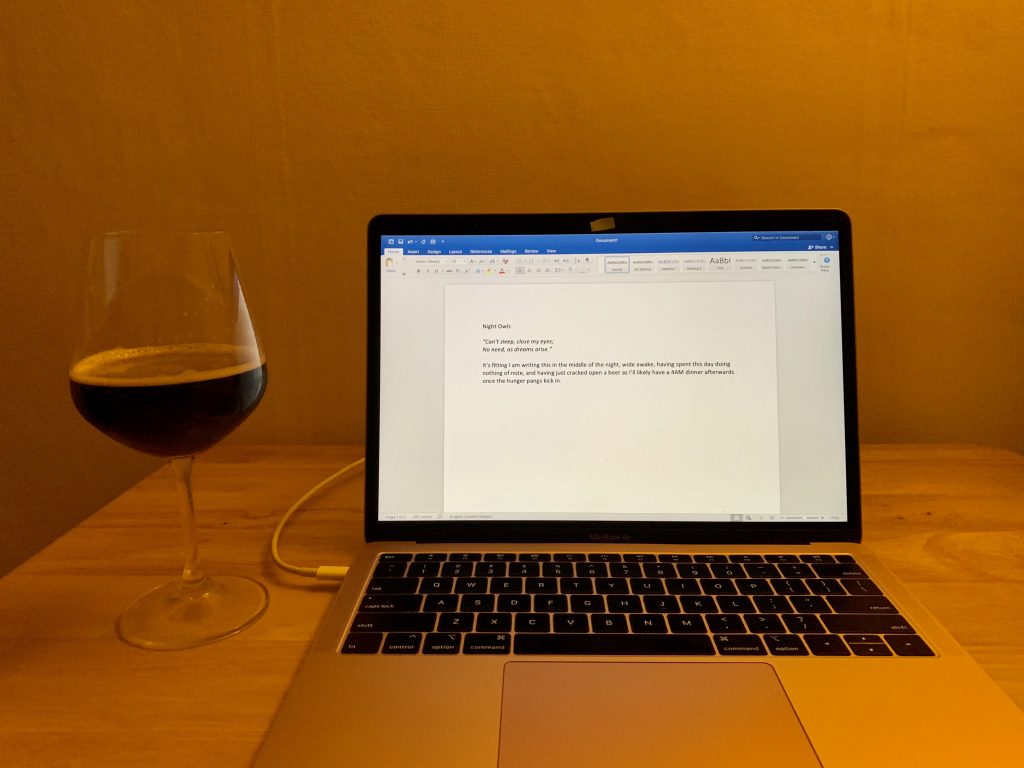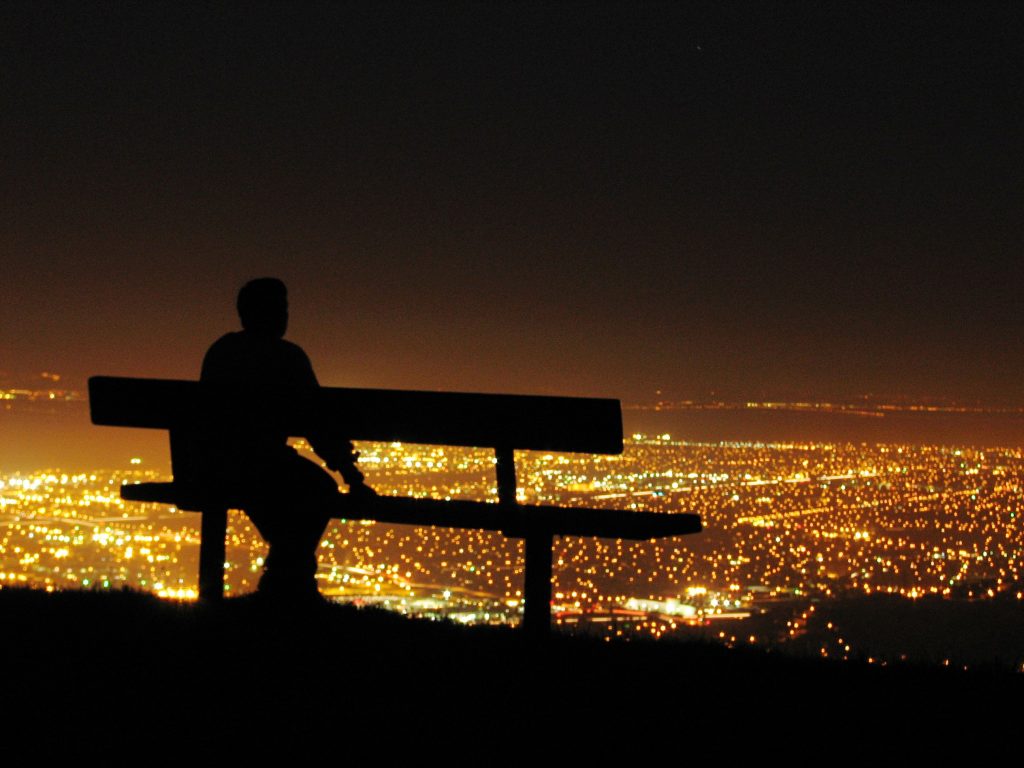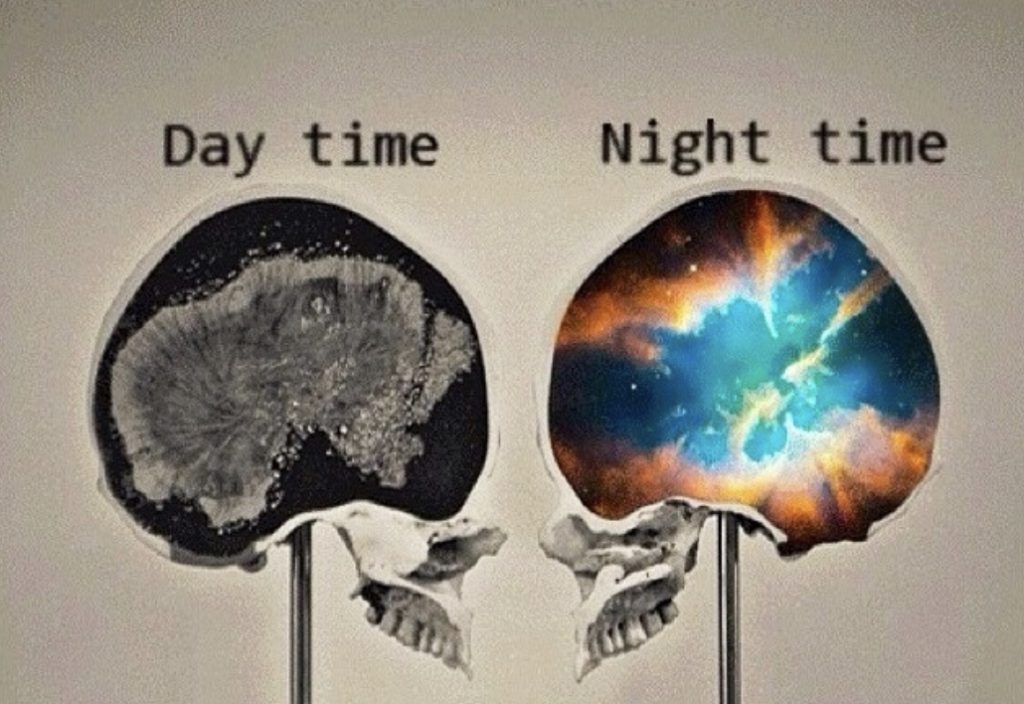
“Can’t sleep, close my eyes; No need, as dreams arise.”
It‘s fitting I’m writing this in the middle of the night, wide awake, and having just cracked open a beer as I’ll likely have a 4AM dinner once the hunger pangs kick in.

My life patterns are not what are deemed as normal or healthy, to which I cannot disagree. I have had a nocturnal pattern since I was eight or nine, back when I’d be forced to go to bed around 10PM by my mother, but would often find myself awake until past 3AM — as a torrent of thoughts swished through my head.
First, the ordinary reflections pass your mind, about what you did that day or want to do tomorrow, about family squabbles, friendships, and the random school assignments here and there. Then, the thoughts become more abstract after midnight hits, as I begin to contemplate about the nature of my mortality, my eventual death, God, and how is it that I am a being on this planet? Why do I exist?
Somewhat peculiar thoughts for an elementary student, but it is from lying in bed I have some of my most vivid recollections of my childhood and teenage years. Whatever the case, my natural disposition is that of an owl. And, if you can relate, I’m sure you have experienced similar nights.

“There is a beauty to the night; a stillness and quiet where I find a peace that the daytime cannot afford.”
We all know the sins to our health that sleeping late incur, so it is in this article I will list some of its benefits.
The most lasting and immediate benefit I can think of is that sleeping late grants an individual a greater intrapersonal awareness. You are more in tune with your feelings and thoughts, and gain a greater awareness of others. While the daytime grants us the focus to accomplishing immediate tasks, it is in the night we are able to think with more clarity about our long-term, more expansive goals — about what we truly aspire to do in our lives and what will define our legacies.

A second benefit in sleeping late is we gain a greater interpersonal awareness. Even with co-workers or old classmates (back in college), our most interesting conversations always occurred after midnight, when the veneer of normality is stripped away and we feel more free to express who we are outside of our daytime selves.
I’ve worked with some of the most unassuming people who I learned much more about from one late evening of conversation than from years spent together in the office. That goodwill carries forward into the daytime as we become more pleasant and accepting of each other’s flaws at work.
“Disclosure breeds trust.”
For that intimacy to develop, however, it would be odd to have such discussions while performing perfunctory tasks in the afternoon. Some conversations are reserved for the night.
Regarding co-workers, they often wondered how I’d walk into work in the mornings with a smile beaming across my face in my twenties, even though I didn’t sleep and was hungover. When I was younger, I didn’t know what to say. I just felt happy. Today, I think I have a better understanding as to why.
Back then, I’d work 12-hour days, six-days a week for half the year. We’d end work at 10PM, then be in the office by 8AM. If all you’re doing is working, no matter the compensation, life becomes depressing. It sucks away at your soul. Since I was going out almost every night, however, I didn’t wake up feeling that same energy. I got to let out my stress through my evening activities. So, by next morning, even though I ended work late, it felt like a long time had passed since I was last in the office because I had spent the entire night out catching up with friends or meeting new people.

As many people today are struggling with staying-in during the Covid-19 pandemic, I think we’re all gaining a greater appreciation for how much spending our evenings out adds to our mental health. And, sometimes, you need an environment outside of your home or comfort zone to strike up new perceptions.
As for relationships, if a first-date doesn’t go past midnight, likely nothing too interesting was discussed. This doesn’t mean the date was bad. It just means it will take a few more dates to get to know them better.
With more time to heed to intrapersonal and interpersonal awareness for night owls, this has led to research findings which indicate they show a greater propensity to intelligence, inductive reasoning, and creativity while also earning higher incomes than early birds (or larks).
A study by the University of Madrid revealed similar findings but, interestingly, showed that night owls perform worse academically than larks. This makes intuitive sense however. The latter are more likely to be industrious and task-oriented, while the former will be more free thinking — and tend to procrastinate as a result. Having class in the morning may also hinder their performance.
According to some scientists, an evolutionary explanation as to why night owls are more likely to be intelligent or creative is because those of us who stray from a traditional morning routine are more adaptively advanced and predisposed to novel tendencies, activities which would occur at night.
If you’re an aspiring artist or inventor, this is good news for you according to Professor Jim Horne, a sleep neuroscientist. Your best ideas probably arise during the late hours, when you’re likely to feel more energetic compared to others. While creatives tend to sleep late, more practically-minded individuals (such as those in accounting or administrative industries) will sleep much earlier.

Regarding energy, night owls also show a rise in their strength and endurance as evening approaches. So it would make more sense for you to exercise after dinner. As for sleep, they show they need less of it. According to a study in which larks and night owls were both assigned to sleep seven hours for two straight nights (then assigned various tasks throughout the day), the results showed that the latter group are not as apt to get tired or show diminishing performance results after ten hours of wakefulness. The findings indicate larks need more sleep, while night owls can continue functioning — at least for a few days — without it.
Contrary to expectations, night owls are not in the minority. In terms of preference in sleeping pattern, our habits fall under a normal distribution, with generally an even number of larks and night owls at the extreme ends — with the vast majority falling somewhere in-between.
It is likely due to the agricultural revolution of the past several thousand years (which shifted society’s routine to waking up early for farming) that explains why we still operate on a morning schedule. In a post-agrarian society, many proponents are calling for work-hours to be later or more flexible, especially with the rise of the Internet and with so many jobs online which do not require in-person interactions to operate.
There is even the Start School Later movement which has gained momentum since the 1990s, where sleep scientists, educators, and health care professionals have called on schools to start no earlier than 8:30AM since young people tend to sleep later than adults. With such a change, studies have shown improved academic performance and less behavioral problems in pupils such as impulsivity, truancy, and depression.
Are we ready for such a shift?
My childhood self sure would have appreciated it. Too many of my mornings were spent asleep by 3rd period…

One reply on “Night Owls”
[…] a noted insomniac (in my post Night Owls), I enjoy listening to This American Life before I go to bed or have trouble sleeping. With my mind […]